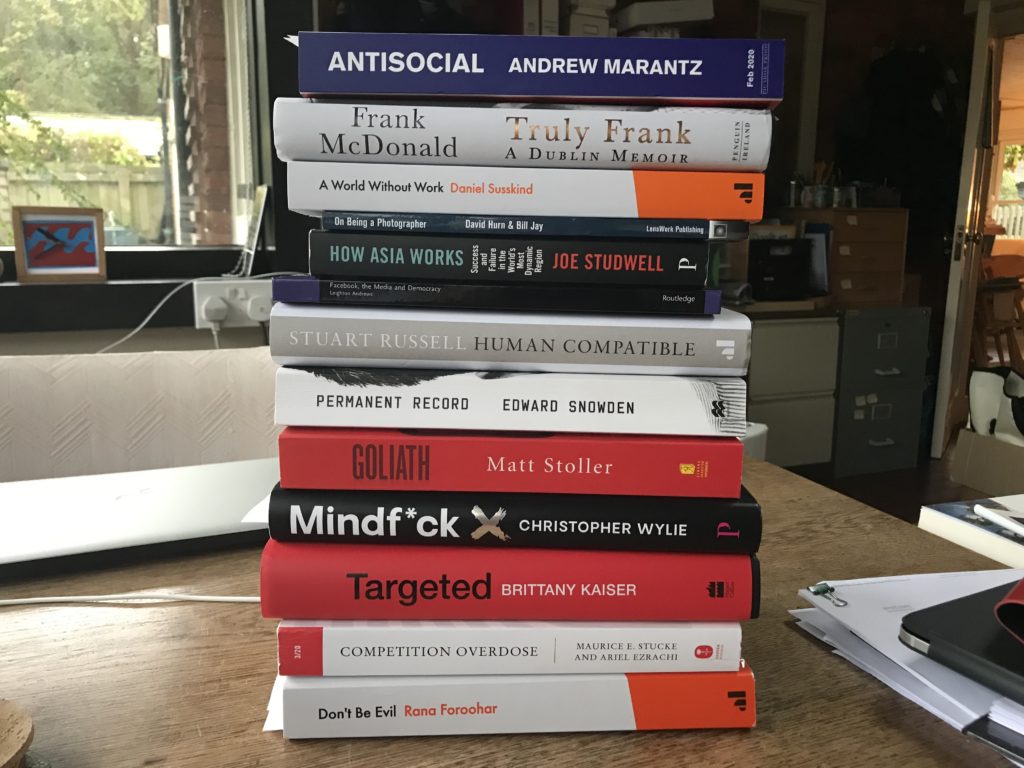In one of my periodic attempts to impose order on my study I rounded up all the books I have been
- reading
- reviewing
- need to read for work
- want to read for pleasure
And, having done so, wondered about my sanity.
From the top down…
- Antisocial: Online Extremists, Techno-Utopians, and the Hijacking of the American Conversation by Andrew Marantz. Just arrived yesterday. Described by Jaron Lanier as “a close-up portrait of the new species of online shock artists who have taken over the American conversation”. I was going to say that I’m looking forward to reading it, but perhaps it’d be more honest to say that I’m gritting my teeth because it’s something I have to read for work.
- Truly Frank: a Dublin Memoir by Frank McDonald. This one is purely for pleasure. Frank was one of the great journalists on the Irish Times, is an old friend and was a Wolfson Press Fellow back in the day.
- A World without Work: Technology, Automation and How We Should Respond by Daniel Susskind. This one is for work but won’t be out until January. I’ll probably review it.
- On Being a Photographer: a practical guide by David Hurn and Bill Jay (Lenswork Publishing, 2009). This is a book I should have known about but didn’t until a fellow-photographer told me about it a few weeks ago.
- How Asia Works: Success and Failure in the World’s Most Dynamic Region by Joe Studwell, recommended to me as a must-read by Nicholas Colin, who I’ve always found to be a terrific source of ideas. This is to fill one of the numerous gaps in my knowledge of the world.
- Facebook, the Media and Democracy: Big Tech, Small State? by Leighton Andrews. An interesting monograph on a topic I often write about.
- Human Compatible: AI and the Problem of Control by Stuart Russell. One of the best books about AI that I’ve read. My review of it for the Literary Review is here
- Permanent Record by Edward Snowden. Terrific memoir, which I reviewed for the Observer.
- Goliath: The 100-year war between Monopoly Power and Democracy by Matt Stoller. Just arrived. I’m looking forward to reviewing it.
- Mindfu-k: Inside Cambridge Analytica’s Plot to Break the World by Christopher Wylie. Terrific account by a geek who was an insider on how data analytics influenced Brexit and the 2016 Presidential election. I’ve reviewed it alongside Brittany Kaiser’s book Targeted: My Inside Story of Cambridge Analytica and How Trump, Brexit and Facebook Broke Democracy. Review will be out on Monday 28 October.
- Competition Overdose: How Free-market Mythology Transformed Us from Citizen Kings to Market Servants by Maurice Stucke and Ariel Ezrachi. Maurice and Ariel wrote a terrific book *Virtual Competition: the Problems and Perils of the Algorithm-driven Economy a few years back. When they told me they were contemplating a critical book on competition, I urged them on. Now they’ve done it, much to my admiration and delight. This is an advanced proof which I’m currently enjoying. Publication date is April 2020.
- Don’t Be Evil: The Case against Big Tech by Rana Foroohar. I’m reviewing it for the Observer.

